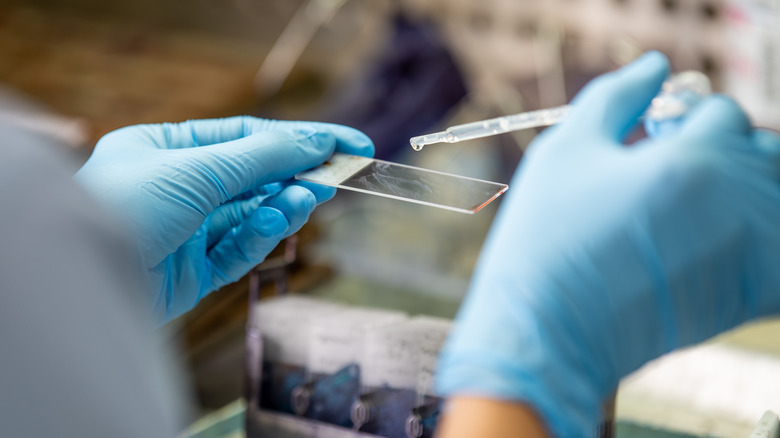What Does It Mean If You Have An Abnormal Pap Smear?
Going to the gynecologist on a regular basis means you'll likely have to undergo a procedure known as a pap smear. The Mayo Clinic explains that this test samples cells from the cervix, located at the base of the uterus. The cells are then tested for abnormalities. It's important to undergo regular testing — every three years for those between the ages of 21 and 65 — in order to catch any abnormalities early on. The World Health Organization reports cervical cancer as the fourth most common in women, making a pap smear an essential screening test.
Luckily, a pap smear is a quick and relatively painless procedure (via the Mayo Clinic). You will be required to remove your clothes from the waist down and lie back on an examination chair. The doctor will have you place your feet up into a pair of stirrups before inserting a speculum into your vagina, which will give them access and sightlines to your cervix. You may then feel your doctor collect a few cells from your cervix using a brush or spatula specially designed for the purpose. While you go about the rest of your day, the sample is sent to a lab for examination under a microscope.
Normal pap smear results mean you'll only need to repeat the test at your next check-up in three years, but what if you get abnormal results?
Don't panic if you get abnormal pap smear results
Your initial reaction to hearing that abnormal cells were found after a pap smear may be to jump to the conclusion that you have cervical cancer, but there's no need to think that right off the bat, explains Self. There's an important distinction between abnormal and cancerous, and the two aren't mutually exclusive.
Dr. Nicole S. Nevadunsky, associate professor in the division of gynecologic oncology at the Montefiore Einstein Center for Cancer Care, spoke with Self about the meaning behind an abnormal test result. She explained that the most common cause of abnormal cells on the cervix is the HPV virus, a sexually transmitted disease. With over 100 different HPV viruses, only a few can actually cause cancer — the presence of the virus is simply altering the appearance of your cervical cells, rather than causing them to become cancerous.
However, it may be necessary for you to undergo further testing to determine the cause of the abnormal cells and any next steps, per the American College of Obstetricians and Gynecologists. Potential tests include HPV typing to determine the type of HPV virus that you've contracted; a colposcopy, which looks at the surface of the cervix with a magnifying device; or simply repeat testing of the cervix within six months to a year of the abnormal pap smear. In the case that the cells are determined to be pre-cancerous or cancerous, you will be referred to a specialist for follow-up.


